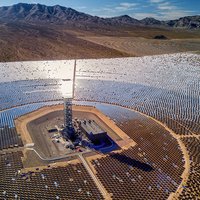Solar Tower Used for Process Heat for the First Time
SoPhosM project: Solar phosphate drying plant to be built in Morocco

SoPhosM project: Solar phosphate drying plant to be built in Morocco

Besides nitrogen and potassium, phosphates are the main component of fertilisers and thus essential for the global food supply. However, the production and processing of phosphates is associated with numerous challenges, including energy-intensive phosphate production.
Morocco is one of the largest phosphate producers in the world – the state-owned company OCP (Office Chérifien des Phosphates) is the world market leader with an annual turnover of four billion euros. So far, this energy has been provided by burning fossil fuels. OCP, however, has set itself the goal of switching to green energy sources by 2030. Together with OCP and other partners from industry and science in Morocco and Germany, the Solar Institute Jülich at Aachen University of Applied Sciences (SIJ) is now developing a process for using solar energy instead of fossil fuels in the production of phosphate. Within the project "SoPhosM – System for the demand-oriented provision of solar process heat for the drying process of phosphate in Morocco," a plant is being built that will dry 100,000 tonnes of phosphate sludge per year. This will save 1,000 tonnes of heating oil. In less than three years, the plant in Morocco is expected to become operational.
The researchers are using a technology that has been developed at the Solar Institute Jülich since 2005 and was first implemented in the Jülich solar tower: Movably mounted mirrors – so-called heliostats – direct the sunlight onto a receiver. The receiver consists of porous ceramic material that is indirectly heated with solar energy using the heliostats. Air flows through the receiver and gets heated to between 600 and 800 degrees Celsius.
Wuppertal Institute undertakes potential analysis and sustainability assessment
The Wuppertal Institute contributes to the SoPhosM project by conducting a potential analysis and assessing the sustainability. The researchers are investigating the potential for using solar process heat in the Moroccan industry. Moreover, they analyse socio-ecological sustainability aspects.
Dr. Julia C. Terrapon-Pfaff, Co-Head of the Research Unit Energy Transition International at the Wuppertal Institute, explains: "With the help of our analysis, we can derive the opportunities and challenges associated with the industrial application of solar process heat. In addition, we also take a look at the framework conditions for the broader application." The consideration of social, ecological and economic concerns already in this early phase of technology development should ensure that positive effects are realised and negative effects avoided in a later expansion, thus promoting sustainable development in Morocco. "With this in mind, we want to identify appropriate development pathways that maximise positive impacts - these include employment and local development, for example."
The project is funded with 1.6 million euros by the German Federal Ministry of Education and Research (BMBF). In addition to OCP and other Moroccan research partners such as the Mohammed VI Polytechnic University (UM6P), the Green Energy Park (GEP) and the Institute Research Energy Solar And Energy Nouvelles (IRESEN), German partners in the project include the Wuppertal Institute, the German Aerospace Center (DLR) and the technology developers and manufacturers Kraftanlagen Energies & Services, Schlaich Bergermann Partner (sbp) and Hilger GmbH.
